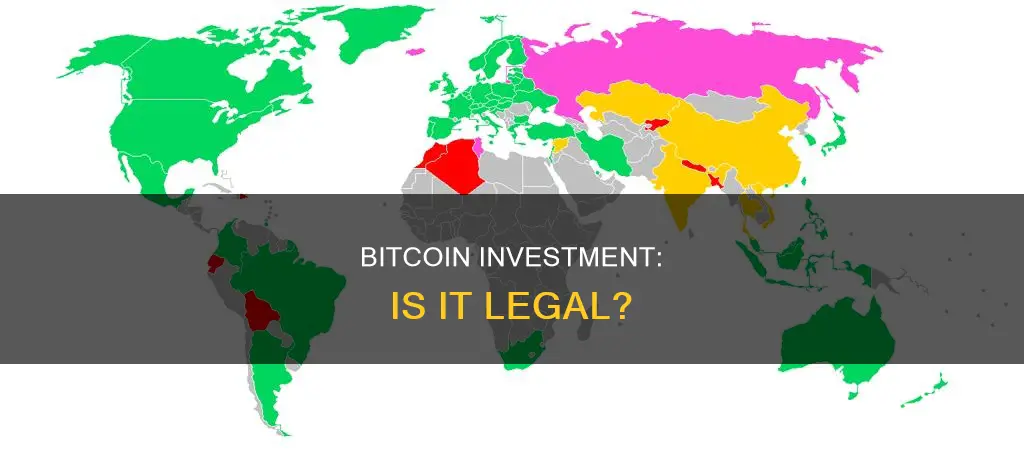
Bitcoin is a cryptocurrency that enables peer-to-peer transactions without government or bank involvement. It was introduced in 2009, and its legal status has been a topic of debate ever since. The regulatory environment surrounding Bitcoin varies across different countries and even states. While some countries like the US, Japan, and the UK have legalised its use, others like China and India have imposed restrictions or bans. The decentralised nature of Bitcoin and the lack of a central authority backing its value contribute to the legal complexities associated with it.
| Characteristics | Values |
|---|---|
| Legality in the US | Legal, but policies vary based on the state of residence |
| Legality in the UK | Legal, considered property and subject to capital gains tax |
| Legality in Japan | Legal tender since 2016, crypto exchanges must abide by AML and KYC policies |
| Legality in China | Banned since May 2021 |
| Legality in India | Not a legal tender, but there is no law banning its use |
| Legality in Canada | Legal, considered a crypto-asset and taxed based on the circumstances |
| Legality in Australia | Legal, considered a financial asset and taxed when specific events occur |
| Legality in the EU | Recognised, but no uniform laws; individual countries can decide their regulations |
What You'll Learn

Bitcoin's legality in the US
As of March 2024, Bitcoin was legal in the US, Japan, the UK, and most other developed countries. However, the legal status of Bitcoin and other cryptocurrencies varies from one jurisdiction to another and is still undefined or changing in many of them.
In the US, the Internal Revenue Service (IRS) considers bitcoin and other cryptocurrencies as property, issuing appropriate tax treatment guidelines for taxpayers. The IRS treats Bitcoin as a "virtual currency", and in 2020, it added a question on the first page of Form 1040, requiring taxpayers to declare if they engaged in any virtual currency transactions.
The legality of your bitcoin activities will depend on where you are and what you are doing with it. While Bitcoin is legal in the US, it is not considered legal tender, and there are no protections for either the consumer or the merchant. Its use as a payment method is completely discretionary.
Some US states are more advanced than others in terms of cryptocurrency oversight. For example, New York unveiled the controversial BitLicense in 2015, granting bitcoin businesses the official go-ahead to operate in the state. However, the requirements are so onerous that many companies and exchanges do not provide their services to New Yorkers. On the other hand, states like Wyoming and Texas have accommodating regulations to attract new businesses. Wyoming passed laws in 2019 treating cryptocurrencies as a legal medium of exchange, and Texas defined cryptocurrencies as a "digital representation of value" in the Texas Virtual Currency Act of 2021.
The Ultimate Guide to Bitcoin Investing
You may want to see also

Bitcoin's legal status in China
Bitcoins Legal Status in China
The legal status of Bitcoin in China has been uncertain, with a history of crackdowns and regulatory changes. However, it is important to note that it is not entirely banned in the country. While financial institutions and banking employees are prohibited from engaging in Bitcoin-related business or services, Bitcoin trading or mining is not illegal for regular citizens.
The People's Bank of China's (PBoC) Stance
The PBoC has played a significant role in shaping the regulatory landscape for Bitcoin in China. In 2017, the PBoC issued a ruling outlawing "initial coin offerings" (ICOs), a method of raising funds by issuing new digital currencies. This move was aimed at scammers and caused uncertainty in the market, with some interpreting it as a ban on all cryptocurrency trading. However, Chinese Bitcoin exchanges continued to operate, indicating a more limited scope for the restrictions.
Regulatory Report by the PBoC
In an effort to provide clarity, the PBoC released its first major report on the legal and regulatory status of Bitcoin. This report officially classified Bitcoin as a virtual commodity rather than a currency, highlighting its lack of legal tender status. The report imposed restrictions on financial institutions and payment institutions, prohibiting them from offering Bitcoin-related services, including registration, transaction, and clearing and settlement services. However, it is important to note that Bitcoin exchanges were not included in these restrictions.
Impact on Bitcoin Businesses
The regulatory report had both positive and negative implications for Bitcoin businesses in China. On the positive side, exchanges were able to continue operating, and a significant regulatory burden was lifted as Bitcoin was not classified as money. However, direct integration with Chinese banks became more challenging, and there were concerns about potential sales tax implications.
Evolving Landscape
China's stance on Bitcoin has continued to evolve, and there have been further developments since the initial regulatory report. In 2018, the PBoC announced a crackdown on cryptocurrency trading and mining, leading to the closure of many platforms. However, as of 2024, there are indications that China remains the world's largest Bitcoin trading market, suggesting ongoing activity despite the restrictions.
Invest in El Salvador's Bitcoin Bond: A Guide
You may want to see also

Bitcoin and taxes
In 2014, the Internal Revenue Service (IRS) in the US released IRS Notice 2014-21, which classified Bitcoin as a property. This means that investors must pay capital gains tax on every cryptocurrency transaction and report it to the IRS in USD every year. This includes profits from Bitcoin mining, payments for goods and services, and other activities.
In 2020, the IRS added a question on the first page of Form 1040, which requires taxpayers to declare if they engaged in any virtual currency transactions. The form asks: "At any time during [year], did you receive, sell, send, exchange, or otherwise acquire any financial interest in any virtual currency?"
The IRS treats cryptocurrencies as property, meaning sales are subject to capital gains tax rules. It is important to note that buying something with cryptocurrency also counts as a sale because you are effectively selling a portion of your holdings to cover the cost of the purchase. The difference between the fair market value of the goods or services received and the adjusted cost basis (the amount paid for the cryptocurrency plus any fees) determines whether the transaction results in a gain or a loss.
For example, if you use one bitcoin to purchase a $45,000 car, but that bitcoin was worth only $40,000 when you bought it, the transaction would result in a $5,000 gain. On the other hand, if the bitcoin was originally worth $50,000, the transaction would result in a $5,000 loss, which could potentially offset capital gains or taxable income in the same calendar year.
Under current US law, the cryptocurrency owner is responsible for reporting all transactions to the IRS. This means keeping records of receipts and confirmations for every purchase and sale. If you cannot prove your adjusted cost basis, you must report it as zero, and the entire sale will be considered a gain.
Not all crypto transactions are taxable, however. The following activities are not considered taxable events:
- Buying digital assets with cash
- Transferring digital assets between wallets or accounts that you control
- Gifting cryptocurrency (excluding large gifts that could trigger other tax obligations)
- Donating cryptocurrency, which is tax-deductible
Taxable crypto activities include:
- Selling digital assets for cash
- Trading one type of digital asset for another
- Using crypto as payment
- Mining or staking crypto
- Receiving airdropped tokens
- Getting paid in crypto
- Receiving interest or yield in crypto
When you sell, trade, or use crypto as a form of payment, you dispose of digital assets, and this disposal could result in a gain or loss depending on your cost basis and the value of the digital assets at the time of disposal. These transactions need to be reported on Form 8949, regardless of whether they result in a gain or loss.
When you receive cryptocurrency from mining, staking, airdrops, or as payment for goods or services, you must report this income on your tax return. The amount of income reported establishes your cost basis, which is the original purchase or acquisition price of an asset.
There are two cost-basis assignment methods allowed by the IRS: First In First Out (FIFO) and Specific Identification. FIFO assigns the cost basis where the oldest unit of crypto you own is sold or disposed of first. Specific Identification allows taxpayers to select which cryptocurrency unit is disposed of in a transaction to minimize any gains or losses.
Crypto taxes can be confusing, especially with the complex blockchain jargon involved, but it is the responsibility of the taxpayer to stay educated on potential tax liabilities when dealing with digital assets.
Strategic Bitcoin Investment: Tips for Success
You may want to see also

Bitcoin's status as legal tender
Bitcoin is not considered legal tender by the US government. The Financial Crimes Enforcement Network (FinCEN) established its guidance in 2013, stating that while virtual currencies can be used as a medium of exchange, they do not have all the attributes of actual currencies. FinCEN does not consider cryptocurrencies as legal tender, and businesses are not required to accept them as payment. However, individuals can use Bitcoin to purchase goods and services as long as the seller is willing to accept it.
In contrast, El Salvador became the first country in the world to adopt Bitcoin as legal tender in June 2021. The law requires all firms to accept Bitcoin as payment for goods and services, and taxes can also be paid using the cryptocurrency. The use of Bitcoin in El Salvador is optional for individuals, and the government guarantees convertibility to dollars at the time of the transaction.
Other countries have also explored the possibility of adopting Bitcoin as legal tender. For example, the Central African Republic briefly recognised Bitcoin as legal tender in April 2022 before repealing the decision in April 2023. Tonga also announced plans to make Bitcoin legal tender by the end of 2023.
The regulatory landscape surrounding Bitcoin and other cryptocurrencies is complex and constantly evolving. While some countries have embraced Bitcoin as legal tender, others have imposed restrictions or bans on its use. The status of Bitcoin as legal tender varies significantly across the world, and it is essential to stay informed about the laws and regulations in your specific country or jurisdiction.
The Ultimate Guide to Investing Money in Bitcoin
You may want to see also

Bitcoin's status in India
However, the Indian government has continued to express concerns about cryptocurrencies, and in 2021, it was reported that they were planning to propose a new law that would ban digital money and fine anyone trading or holding such assets. This law would have made India the first major economy to make holding cryptocurrency illegal.
The proposed bill, which aimed to criminalise possession, issuance, mining, trading, and transferring crypto-assets, caused apprehension among crypto exchanges and investors, who feared an exodus of talent and business from the country. In response to the proposed bill, Union Finance Minister Nirmala Sitharaman clarified that there would not be a complete ban on cryptocurrency. She stated that the government was not shutting off all options and was working on a Cabinet note that would provide exhaustive information on the formulation of cryptocurrency in India.
As of March 2024, the legal status of cryptocurrencies in India remains unclear. While Bitcoin is legal in most developed countries, some countries, like India, have banned it completely. It is important to note that the regulatory landscape for cryptocurrencies is constantly evolving, and laws and regulations can change over time. Therefore, it is essential to stay updated on the current laws and regulations regarding cryptocurrencies in India or any other country before making any investment decisions.
The Ultimate Guide to Investing in Bitcoin and Ethereum
You may want to see also
Frequently asked questions
It has never been illegal to buy and hold Bitcoin in the United States, at least not at a federal level. The US is among the countries where Bitcoin is legal, but policies vary based on the state of residence.
Bitcoin is not a legal tender in India. However, there is currently no law that bans the use of Bitcoin or other virtual digital assets (VDAs). As a result, you are allowed to trade Bitcoin in India.
China is among the countries where Bitcoin is banned. In May 2021, China banned crypto and restricted financial groups from providing any Bitcoin-related services.
Bitcoin is legal in the UK. As of 2020, Bitcoin is considered property in the UK, meaning it is subject to capital gains tax.







